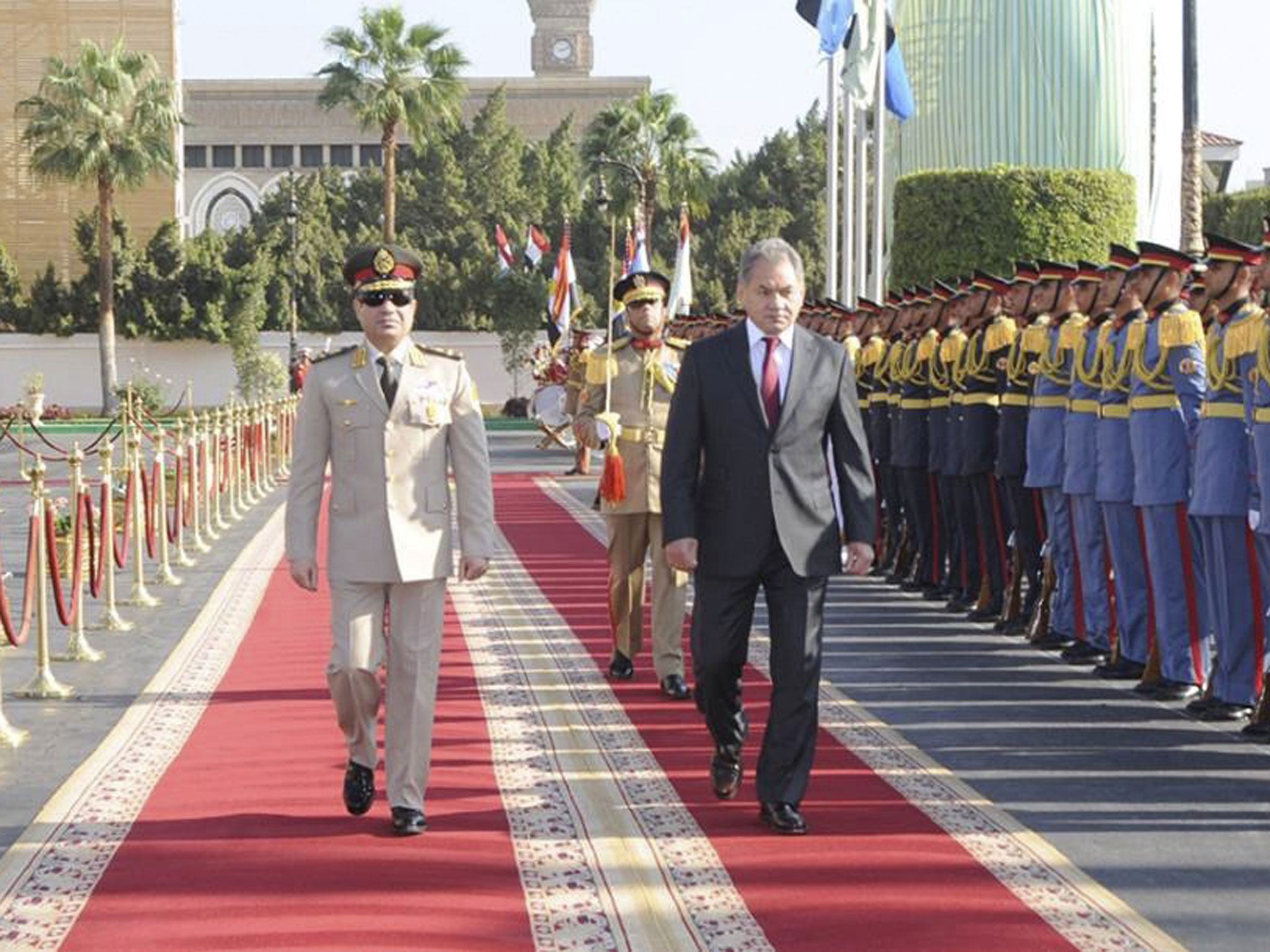Red carpet for Russians fuels speculation over Egypt's US alliance
Some analysts interpret Moscow delegation's trip as a shot across Washington's bows

Your support helps us to tell the story
From reproductive rights to climate change to Big Tech, The Independent is on the ground when the story is developing. Whether it's investigating the financials of Elon Musk's pro-Trump PAC or producing our latest documentary, 'The A Word', which shines a light on the American women fighting for reproductive rights, we know how important it is to parse out the facts from the messaging.
At such a critical moment in US history, we need reporters on the ground. Your donation allows us to keep sending journalists to speak to both sides of the story.
The Independent is trusted by Americans across the entire political spectrum. And unlike many other quality news outlets, we choose not to lock Americans out of our reporting and analysis with paywalls. We believe quality journalism should be available to everyone, paid for by those who can afford it.
Your support makes all the difference.Egypt rolled out the red carpet for one of the most high profile Russian delegations in recent years today - a visit which led to speculation that the decades-old alliance with Washington is under threat following Western criticism of the recent coup d'etat.
Foreign Minister Nabil Fahmy appeared keen to swat away any suggestion that relations with the United States were cooling, insisting that today's visit was merely aimed at boosting ties with Moscow and would not jeopardise existing relations.
"Russia has had a relationship with the Egyptian people for dozens of years," said Mr Fahmy, adding that Egypt was not looking for a "substitute for anyone".
But given how frosty Egypt's keystone transatlantic alliance has become in recent months, some analysts interpreted the trip as a shot across Washington's bows.
"The relationship between Egypt and the US has deteriorated since the summer," said Alexey Malashenko from the Carnegie Moscow Center. "The Egyptians are now dreaming about the possibility of improving relations with Russia."
Yesterday's delegation was led by Russia's Foreign Minister Sergei Lavrov - but also included Defence Minister Sergei Shoigu, whose presence on the trip has led to speculation that Egypt might be planning to recalibrate its foreign policy by signing a major arms deal with Moscow.
Officials have sought to pour cold water on such speculation, while a Moscow news agency quoted the Russian state arms dealer as saying that no such deal was in the pipelines.
Yet events over the past three months lend credence to the theory that Egypt may be seeking to find a way to shift itself beyond America's orbit - or at the very least, register the considerable displeasure felt towards its long-time ally.
Following the uprising which eventually toppled Mohamed Morsi on 3 July , Egyptian feathers were ruffled by American lawmakers disapprovingly referring to what happened as a coup - a word which to this day can generate an astonishing capacity to rile supporters of the anti-Morsi revolt.
But following the events of 14 August - when several hundred Islamist protesters were massacred in a single day by the security services - relations deteriorated further when America froze a large slice of its annual $1.3bn military aid package to Cairo. Consignments of tanks, helicopters, missiles and fighter jets were subsequently shelved.
The move led to a tide of anti-American feeling across Egypt - along with editorials calling for ministers to strengthen their armoury by scouting for weapons elsewhere. In Alexandria, a huge poster of Vladimir Putin was unveiled along with the words "Bye bye America!".
Mohamed Salmawy, an Egyptian journalist who joined a 'popular delegation' to Russia last month, told The Independent he hoped yesterday's visit would create an element of 'balance' in the country's international relations. "I think it would be beneficial if Egypt wasn't totally dependent on one country," he said.
During the days of Gamal Abdel Nasser, Russia was Egypt's staunchest super-power ally. But in 1972 new President Anwar Sadat expelled 20,000 Soviet military advisors and their dependents - at a stroke reordering Egypt's foreign policy and joltingly beginning the shift towards America.
Join our commenting forum
Join thought-provoking conversations, follow other Independent readers and see their replies
Comments